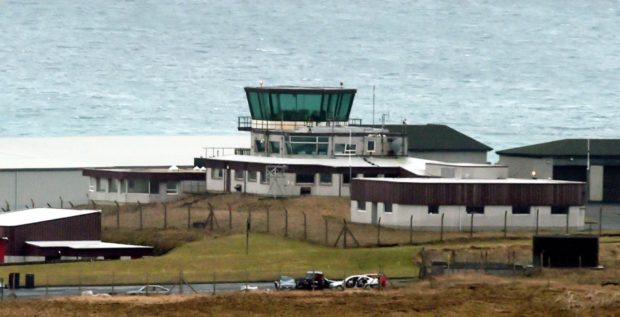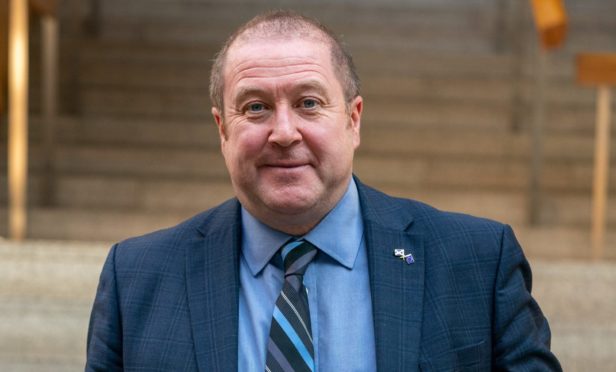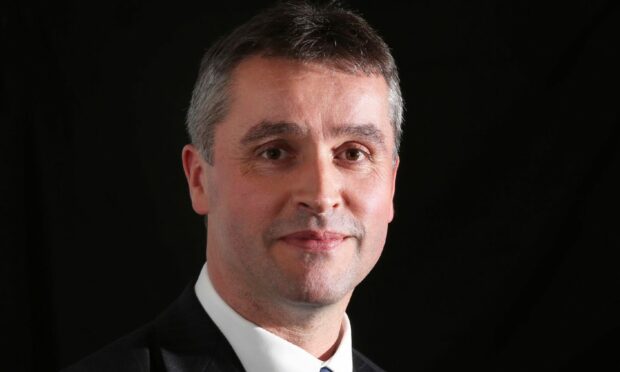A Nationalist MP has urged his party’s transport chief to “open his laptop and engage” with cross-party demands to save airport jobs.
Angus MacNeil criticised colleague Graeme Dey over the controversial plan affecting his Western Isles constituency, as well as Dundee, Shetland and Orkney.
Government-owned Highlands and Islands Airport Ltd wants to centralise air traffic control jobs in Inverness.
The proposal has infuriated local politicians who came together with the Prospect union to force a re-think.
They claim Mr Dey has been silent, despite concerns among his own party.
Mr MacNeil, who took part in cross-party talks last week, said he previously managed to get a Tory minister in Westminster to visit and listen to concerns about Coastguard jobs.
“All we’re looking for is for Graeme Dey to open his laptop and engage,” he said.
“Mike Penning came north to hear us. I’d praise our transport minister too, but we can’t have the government being led by an arms’ length organisation like HIAL.”
Asked to respond to the direct criticism, the Scottish Government stood by the plan and said “no alternative” has been put forward.
A green deal?
Mr MacNeil, SNP MP for the Western Isles, also suggested protecting the jobs, particularly in island communities, could be part of a proposed deal for government between the SNP and Green party.
Mr MacNeil said: “Any green deal must put this into writing.
“It’s good all parties are in agreement that the government should save money and these jobs stay in the islands. Perhaps it might be incumbent on us as SNP and Greens in the Highlands to make that clear.”
He claimed the government could save money by making local upgrades and refusing to follow the HIAL plan.
Members of the Prospect union staged a one-day strike on July 29 in protest at the scheme, which affects Sumburgh, Stornoway, Dundee, Kirkwall, and concentrates services in Inverness. Benbecula and Wick are also affected by proposed changes.
The union says centralisation will remove high value jobs from remote communities, forcing redundancies. They also accused the Scottish Government of refusing to meet communities.
Prospect assessed £1.5million in direct employment will be removed from local economies.
David Avery, from Prospect, said: “We want the government and HIAL to engage in a serious conversation about direction. Far from there being no alternatives, there is a lot to do.”
The European Transport Workers’ Federation has also written a strongly-worded letter to transport minister Graeme Dey calling on Scottish Government to reverse the controversial decision to centralise air traffic control services and operate them remotely.
‘Shameful and astonishing’
Meanwhile, Scottish Labour leader Anas Sarwar turned up the pressure on the government.
He met local council leaders during a two-day trip to Lewis, where he said: “I find it shameful and astonishing that neither the Cabinet Secretary for Transport nor the Transport minister has been prepared to meet, listen and learn as I have done today.
“The air traffic controllers have very real concerns about safety issues and the reliability of services as well as wholly understandable concerns about keeping these jobs in island communities. Ministers are responsible for all of that and cannot remain in hiding, while HIAL management try to ram it through.”
An impact assessment for HIAL earlier this year estimated the centralising plan would cut the equivalent of 48 full-time jobs in the rural airports. The report highlighted the “very significant negative impact” of losing jobs in the islands.
The decision to modernise air traffic control will ensure that air services can continue in the future.”
– Scottish Government
Dundee would not suffer a wider economic blow on the same scale, but 11 staff in the city and neighbouring areas, including Mr Dey’s constituency, would be affected.
A spokesman for HIAL said: “Unless we move forward with our modernisation programme we cannot guarantee air connectivity for the Highlands and Islands into the future. ATMS (air traffic management strategy) will modernise the way airspace is managed and, importantly, deliver more resilient and safer air navigation for decades to come.
“As a public body HIAL is subject to the Scottish Government’s ‘no compulsory redundancy policy’. There will be no reduction in the number of jobs in the new air traffic management structure.
“Our air traffic colleagues are highly valued members of our team, and our priority is to retain them within HIAL.
A Scottish Government spokesman said: “The decision to modernise air traffic control will ensure that air services can continue in the future.
“The option chosen by HIAL in 2018 will improve resilience, safety and reliability of services. It remains the case that no alternative has been proposed that addresses the issues that the ATMS programme aims to resolve.
“HIAL continues to engage with its staff, unions, airline customers and other interested parties as the programme is implemented.”
HIAL said it was disappointed in the strike and explained talks are being held on a “commuting policy” among other proposals as part of its planned transition.


